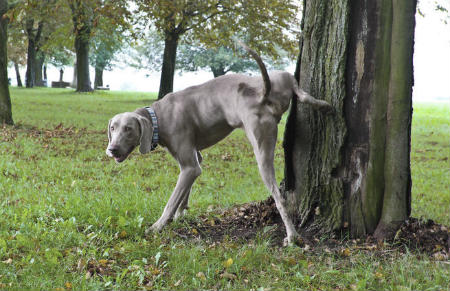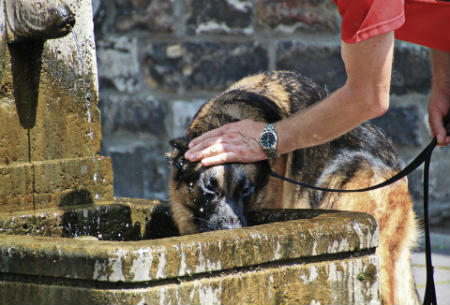Renal insufficiency in older dogs
At present there are numerous conditions that can limit the good physical condition and well -being of our Canine friends, even more when they are older. One of them is renal failure.
The Renal insufficiency in older dogs It is one of the most common diseases that can attack the health of these animals. In fact, it is one of the largest canine mortality index in recent years.
That is why in this article we will talk a little about renal failure in older dogs: its causes, consequences and treatment are some of the important aspects that anyone with a pet dog should know to combat this condition.
Renal failure in dogs: What is it?
Renal failure in dogs is a condition that occurs when The animal's kidneys are not able to function properly in the removal of waste, which produces the concentration of urine.
The animals organism, generally, naturally originates numerous toxins throughout the day. These toxins move through the bloodstream to the kidneys, where they are filtered by water, to later be eliminated from the body through urine. When this process is not carried out correctly, but the toxins are stagnant in the bloodstream, it is when Renal failure in dogs occurs.
Renal failure in dogs can occur acutely or chronicly.
Acute
It's a sudden process Associated with different aspects, such as excessive blood hemorrhage, or conditions of the circulatory system in animals due to the intake of inappropriate medications or toxic substances. Generally anorexia, dehydration or urinary problems can be the cause of this renal failure in dogs, and in most cases it is reversible.

Chronicle
It is a Irreversible condition. There is generally talk of chronic renal failure in older dogs because it is a slower process that is growing over the canino years. It is caused by acute prolonged renal failure over time when it is not treated. Canine diseases, such as hypertension or diabetes, can contribute negatively to the appearance of this disease. There is talk of chronic renal failure in older dogs when only a functionality of 30% in the kidneys occurs.
How to know if my dog can suffer from kidney failure?
We can notice the presence of renal failure when the dog ingests excessive amounts of water during the day and increases more and more. There will come a time when the water level ingested by the animal will not be enough and the conditions will begin due to the presence of harmful substances in the blood and the incorrect functioning of the kidneys in its elimination.

This is known as excessive thirst: you will observe your dog constantly in search of water and urinating repeatedly. Decolored and unconcentrated urine is another frequent symptom, as are the loss of strength, pain when urinating, vomiting, decreased urine and breath with the smell of ammonia, are symptoms that the disease is in constant progress, increasingly deteriorating the health of the dog.
In addition, renal failure in dogs usually presents other symptoms, such as loss of coordination. In this case, the dog is disoriented and discouraged. The absence of appetite, thinning and decreased muscle mass are other characteristic symptoms of possible renal failure in dogs.
What consequences does renal insufficiency in dogs have?
The Complications of renal failure in older dogs They are usually diverse. From the deterioration of the health and welfare of the canine, to other aspects of the animal can be some of the most frequent. Because harmful substances accumulate in the dog's body that should be eliminated by urine, one of the consequences of renal failure in dogs is usually the bad breath and appearance of oral ulcers.

The alteration of the dog's blood pressure is another of the results of renal failure. That, in turn, can cause visual alterations. Anemia, dehydration, pain and fluid retention, are some of the most visible complications when renal failure is presented in older dogs.
Renal failure treatment in dogs
Once the renal failure in dogs is confirmed, the veterinarian will indicate the medications to maintain the health status of the canine. If it is an acute disease, the recommendations are fixed to improve the feeding of the dog, necessarily providing amino acids and vitamins in the feed that is given to our friend, in addition to vitamin supplements that help reduce this alteration in the animal.

In cases of greater gravity, in addition to the food and supply of vitamins, it seeks to establish a balance in the body and functioning of the dog's kidney, indicating medications to increase circulation and others that contribute to suppressing the toxins produced by the dog's body.
Prevention of renal failure in dogs
Although renal failure in many cases is difficult to detect and prevent, some aspects could contribute to the risk of contracting it.
- Take care of canine feeding: It is undoubtedly one of the most important aspects to avoid this disease. Take care that the consumption of food and water is balanced will ensure that the possibility of appearance of renal failure in dogs is minimized.
- As far as possible, decrease the use of medicines of different types and surgical procedures: it also contributes to renal insufficiency in dogs does not appear.
- Manage adequate and indicated treatment in time by a veterinarian in case of Bacterial infections: It is undoubtedly another key element to eliminate the possibility of renal failure in dogs.

Finally, the periodic visit to the doctor and the constant monitoring of the dog's health, are an important part of this preventive process. Routine exams and checks are essential to keep the dog with good health and move away the possibility of renal failure that affects its condition and well -being.
Other articles about health in dogs that may interest you:
Share
